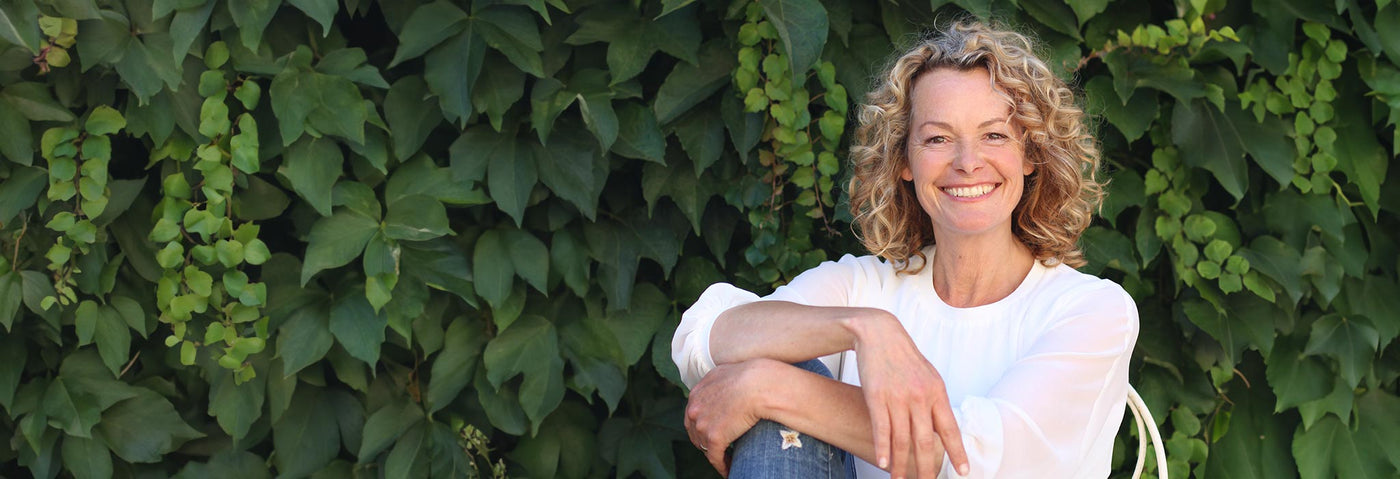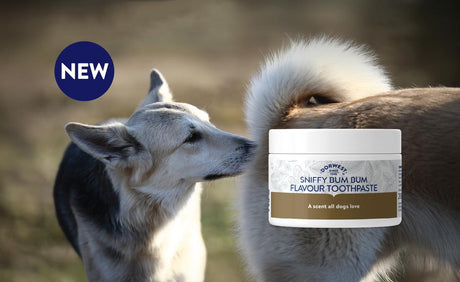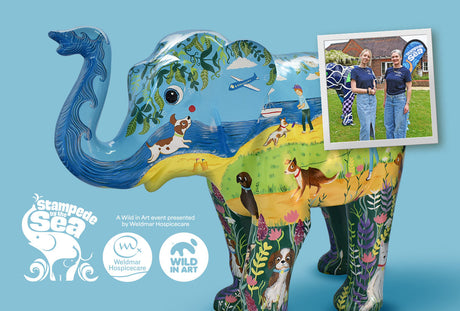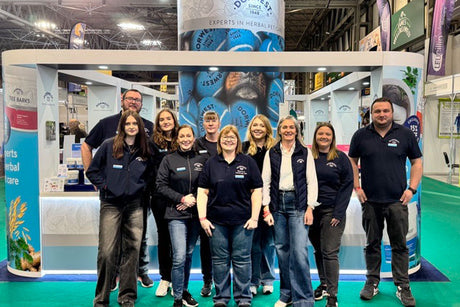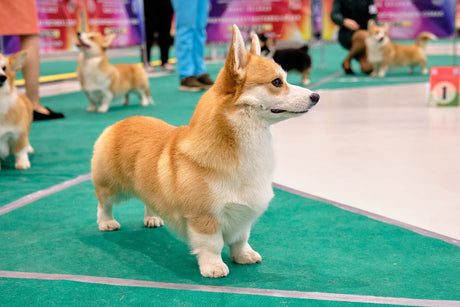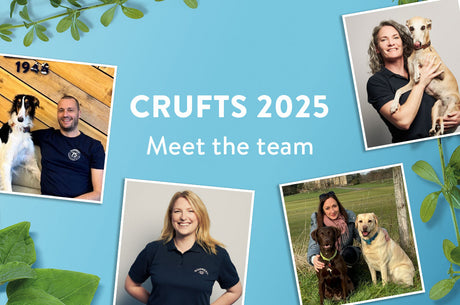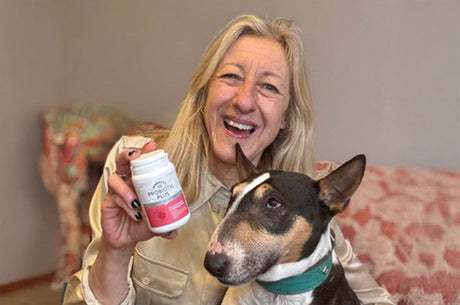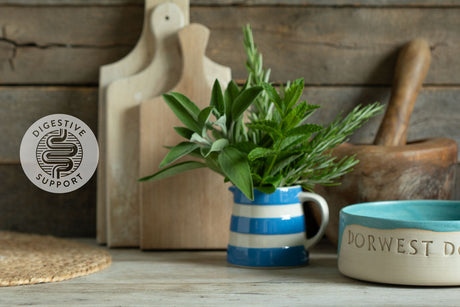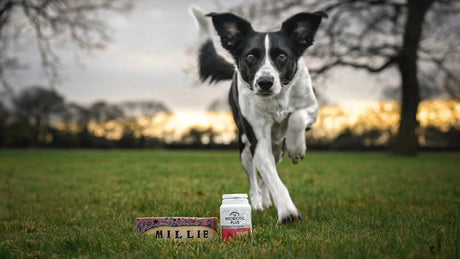This year, we are partnering with broadcaster Kate Humble for our calming campaign for fireworks and recently interviewed Kate on how her impressive career (and love for wildlife) started, her own fireworks routine for her dogs, and why she believes holistic care is so important for our pets.
Kate Humble’s television career has spanned almost three decades, presenting programmes including: Springwatch, Escape to the Farm and Countryfile. As a huge dog lover, it was a natural partnership for Kate to support our calming campaign to help settle fireworks, as she has first-hand experience of supporting anxious dogs.
We caught up with Kate on where her love for wildlife started, her impressive career and why she believes holistic care is so important for our pets.

Q1 - From an early age, you had a very ‘outdoorsy’ childhood, including riding horses and getting hands on mucking out - is this where your love of wildlife started?
"It was! Growing up in the countryside was formative for me. But it was also a time before screens, mobile phones, 24-hour television and multiple channels. Shops were shut at weekends. So, you had to make your own fun. We were encouraged to be outside as much as possible. And being outside with nothing ‘organised’ to do, meant that we explored. We climbed trees, built camps, but also collected snails and caterpillars, built make-shift aquariums from ice-cream boxes. Had ‘treasures’ – stones with bits of quartz in them, conkers, beautiful fragments of shell from the blackbird nest under our kitchen window after the eggs hatched. Wildlife was just part and parcel of our lives, but always fascinating and always exciting."
Q2 - After your education, you travelled to Africa and one of your first jobs is referenced as driving safari trucks. Can you tell us about this experience?
"I was always curious about the world and had a yearning to travel. We didn’t really go abroad as a family – it was too expensive – so most of our holidays were in the UK. And there is nothing wrong with that! We live in an incredibly beautiful and diverse country. But I loved reading books by explorers and travellers and was particularly inspired by women like Dervla Murphy, Christina Dodwell and Hilary Bradt. Africa to me seemed the ultimate adventure – a continent that still felt relatively unexplored and untamed. I worked for over a year in pubs and offices to save the money to go, but still only had £800 in spending money when I got there. I knew, almost immediately, that I wanted to stay as long as possible and so needed to find work.
I was offered the job of co-driver and cook on a safari. The clients were flown in light aircraft from Cape Town, via Botswana and the journey finished at Victoria Falls in Zimbabwe. We were the ground crew, following by truck. For a 19-year-old who had barely been out of Berkshire it was an incredible, eye-opening experience. I’ll never forget driving across the Kalahari Desert and the heat was like nothing I’d ever felt before. The whole landscape glimmered in the haze and seemed to stretch on and on – an endless, limitless space. It was so hot that halfway through the morning the water in our water bottles was hot enough to make coffee with! But it was my first encounter with birds and animals that you don’t find in Britain. Lilac breasted rollers, soaring eagles, herds of springbok, giraffe, and elephant. And to go to sleep at night in a tent listening to lion roaring is both thrilling and terrifying!"
Q3 - What other jobs did you do in Africa?
"I also worked on a crocodile farm in Zambia. One of my jobs was to check the eggs that were being incubated and when any started to hatch, make sure the hatchlings came out of the shell safely. I would shake the tray of eggs very gently, whilst imitating the call of a female crocodile to her young (I’m told I’m very convincing!) and then listen. If any of the eggs called back, I knew they were ready to hatch and would gently break the shell, but learnt to get my fingers out of the way quickly, as the hatchlings, which were only about 20cm long, still had very sharp teeth, and they would latch onto your finger like a stapler, and not let go!"
Q4 - You started in the industry initially with acting, going on to present programmes including Top Gear and Tomorrow’s World, can you tell us how your television career got started?
Q5 - At what point did your passion as a life-long animal lover crossover with broadcasting, presenting wildlife programmes including Animal Park and Springwatch?
"It was quite early on. The BBC had broadcast a documentary called Lion Country which was a behind the scenes look at Longleat House and safari park. It proved to be so popular, they decided to do another series, but with presenters. I was asked to present it alongside Paul Heiney. The series was re-named Animal Park. That was in 1999. Ben Fogle joined me the following year, having made his name on Castaway and we’ve been doing it ever since! There was a new series this summer and we have programmes coming out for Christmas too.
Not long later I had a call from the BBC Natural History Unit. They knew I was a scuba diver and asked if I would take part in a new, cutting edge series they were doing on the deep sea. I was sent to the Cayman Islands to film a very rarely seen shark that lives in what is known as the ‘twilight zone’ – 300 metres below the surface. We spent several nights in a submarine trying to capture this incredible animal on film and when we finally saw it, I had to be able to react as if it was live television. I knew I wouldn’t get a second chance. After I did that I was asked if I would be one of three presenters on a brand new live wildlife series in the UK. I joined Bill Oddie and Simon King and together we did a week of live programmes called Wild in Your Garden. That was the series that was to become Springwatch!"
Q6 - You’re a very successful writer, what inspired you to write ‘Friend for Life: the extraordinary partnership between humans and dogs’?
"I was lucky enough to work on One Man and His Dog. I had always loved watching it, mainly because of the incredible partnership between human and dog. It was as if they could read each other’s minds. To me it was as beautiful as watching a pair of really good dancers on Strictly! I really wanted to learn how to work with a dog and in 2013 I got a Welsh sheepdog puppy. I had never had a puppy before – the two other dogs I had then had both come from rescue homes and I got them as adults – so it was a huge learning curve. I realised, very quickly, that a dog that is bred to work is a different sort of animal altogether. Teg was always so clever, so active and it became very obvious, very early on, that she needed constant stimulation. I was, if I’m honest, completely out of my league, so I asked for help – and the Welsh Sheepdog Society was amazing and helped me harness Teg’s absolutely natural instincts and abilities so that she became a really excellent sheep and cattle dog. Jobs that would be almost impossible without a dog suddenly became possible. And it made me realise what an extraordinary alliance this is – the one between humans and dogs. So I started to look at other ways that dogs have become intrinsic or vital to human lives. It was a fascinating and illuminating book to research and write.
I love dogs for all sorts of reasons – they give me the perfect excuse to go for a walk (I love walking!), they are clever, curious, funny and often better company than most humans!"
Q7 - Can you tell us about dogs you’ve owned, including sheepdog Teg?
"Our first dog was Badger – a Heinz 57 from the RSPCA who had suffered really terrible cruelty. He was scared of everything – not just fireworks and thunder, but pigeons and rabbits too…. It took two years of very careful care to help him become more confident, but he was the most wonderful, scruffy, funny, characterful dog. We got Bella, a Border terrier cross when we’d had Badger for two years. She came from the Dogs Trust and she was the most brilliant little dog. She had problems with her back legs – perhaps why she ended up in a rescue centre – but we managed it by keeping her very active and on a careful diet and later with the amazing help of a McTimoney practitioner. She was very greedy, very affectionate and loved nothing more than sleeping upside down on a cushion. Both she and Badger lived until they were 14 or 15.
Teg was my first puppy. She is 11 now and retired. When she was working she slept in a stable at night – now she’s discovered sofas…. She was the most amazing working dog, has been on TV and often gets recognised more than me and has been my long distance walking and camping companion when we walked the length of the River Wye and right across the Brecon Beacons.
We found Mouse two years ago after Bella died. She is another little scruffy brown terrier mix and she came from the Blue Cross. She is now 8. It took her a while to settle, and I don’t think she’d lived in the country before, so she had to learn about livestock, but Teg has proved a really good teacher and keeps her in line! She is obsessed with playing with balls and frizbees and loves swimming. She has stolen our hearts!"
Q8 - Do you support your dogs with any holistic care (including supplements)?
"Yes. We’ve always fed our dogs on raw food, which seems to suit them very well. Badger, having been starved before we got him, was a very fussy eater who couldn’t manage anything rich, so raw food was brilliant for him. McTimoney (chiropractic) absolutely transformed Bella’s mobility and Teg now has a treatment every six months or so as she has arthritis. We give her supplements every day – tablets and oil – to help her joints.
Mouse has a skin allergy which she is on medicine for, but we also give her an oil supplement which helps too."
Q9 - Do you take your dogs abroad with you?
"Yes, although it is a lot more expensive now than it was pre-Brexit. But we have a tiny off-grid cabin in a very rural part of France. It is on a lake and in the woods and the dogs love it!"
Q10 - Have any of your dogs (or animals!) ever had any anxieties, including noise anxieties?
"Badger was more anxiety than dog! He was terrified of any loud noises – cars backfiring, thunder and fireworks, and would shake uncontrollably and be frozen to the spot. Nothing you could do or say made him feel better.
Teg also gets anxious, although her reaction is less extreme. She tends to just come to one of us for reassurance. But Mouse is terrible. She seems to pick up something in the atmosphere when a storm is coming – even before any thunder or lighting – and will try and dig a hole wherever she is to escape. She’ll try and get under a cupboard or a chair, or press herself right in the darkest corner of a room. There was a storm when we were staying at someone’s house and she went and hid in the shower."
Q11 - How do your dogs react to fireworks? What steps do you take to support them?
"Luckily we live in a very rural area with a lot of livestock around, so people tend to be very sensitive and careful about fireworks, but on the occasions where we know fireworks are going to be let off, we either try and be somewhere else out of earshot, or we keep the dogs with us, play music, try and distract them. Badger liked to be held, but Mouse retreats into her corner, so we build a little camp around her with a blanket and a chair and that seems to help."
Q12 - What ways have you personally, or seen others, try to do to support stressed or anxious animals?
"Animals are acutely aware of the emotions humans are feeling. They know if you are anxious or angry or stressed. So the best way to support an anxious animal is to be as calm and normal around them as possible. Like people, they all respond differently. Badger needed physical reassurance, Mouse just wants to be left in her little private safe space."
Q13 - Why is it important to you that we care about, and look after, our animals?
"Taking on the care of an animal – any animal – is a huge responsibility. A domesticated animal has been bred to be dependent on us, so if we don’t look after them properly we can cause a huge amount of unnecessary suffering for that animal. Keeping an animal fit and healthy, making sure it has a good diet, enough stimulation and enough care is the duty of anyone who has an animal. But there is also great pleasure to be had from having a happy, healthy animal – and the rewards you get in return are priceless."
The calming campaign
Every year we run our calming campaign for fireworks from September to November to promote our calming range to help noise anxiety and highlight different ways owners can prepare to keep them calm when scary noises go off.We have two products that we promote as part of our calming range.
- Our Scullcap & Valerian Tablets work by reducing stress by naturally supporting the calming pathways within the nervous system. We recommend use for 3 weeks before seeing results.
- Valerian Compound- a liquid that can be put directly into pet’s mouths or on food. This can be used as a ‘top up’ to the tablets, or on its own, and works within 30 minutes – so ideal for unexpected fireworks!
For more from Kate and how to support your pets this fireworks season, follow us @dorwest and sign up to our newsletter at dorwest.com. Plus, our 2024 calming campaign page will be here from September, where you can save 25% off our calming combos using the code FIREWORKS24
Don't miss out > Calming campaign – Dorwest